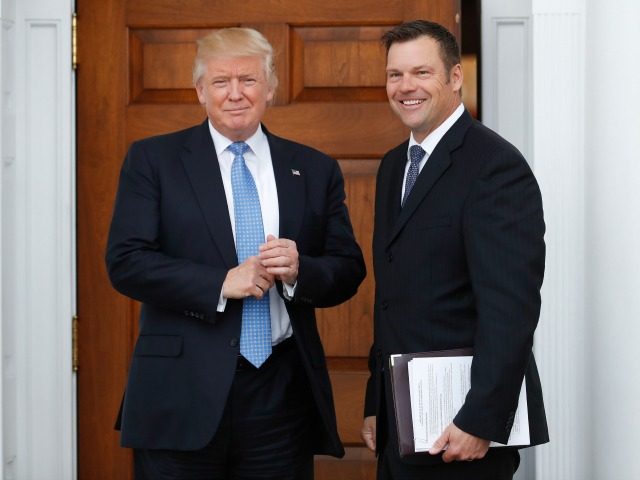As Kansas Secretary of State, I have fought for measures to reduce voter fraud — most notably photo ID laws and proof of citizenship requirements.
As it happens, last week I was a candidate in an election battle that vividly made the case for such election security measures.
Ensuring that only qualified U.S. citizens are permitted to vote (and that nobody votes twice) is always important, but it is doubly important when the election is a close one. The 2018 Republican gubernatorial primary in Kansas will go down in the record books in that regard. It was the closest in modern history in Kansas.
On Monday, the last of Kansas’s 105 counties finished tallying their provisional ballots and published their unofficial results. The total number of votes that went to me was 128,838. The total number of votes that went to incumbent Governor Jeff Colyer was 128,488. The margin of victory was only 350 votes, out of more than 317,000 cast.
Progressive writers, who reflexively oppose election security laws, constantly claim that because the number of fraudulent votes is a small percentage of the total votes cast, election fraud is a non-issue. The hyper-Leftist Brennan Center for Justice at the NYU School of Law even calls voter fraud a “myth,” because the number of fraudulent votes pales in comparison to the number of legitimate votes. This same argument is also mindlessly parroted by progressive reporters when they are presented with real cases of voter fraud. So what if there were a few hundred fraudulent votes, they say, when hundreds of thousands of votes were cast?
But the logic of their argument is shattered when an election is close. In my election, 351 fraudulent votes (a little more than 1 in 1,000 votes cast) would have been enough to change the outcome of the election.
The Left’s argument — simply comparing 351 to 317,000 and attempting to draw a conclusion about the significance of voter fraud — is idiotic. Of course the former number is much smaller than the latter. But that does not logically lead to the conclusion that voter fraud is inconsequential or, as the Brennan Center puts it, a “myth.” When an election is close, a few hundred votes are enough to change the outcome.
Fortunately, Kansas has the most secure election laws in the country, with photo ID requirements, prosecution of voter fraud by the secretary of state and the attorney general, and proof of citizenship at the time of registration (which is currently on hold, pending the appeal of a federal district court decision). So it is highly unlikely that voter fraud changed the outcome.
The same could not be said for the infamous U.S. Senate election contest between Norm Coleman and Al Franken in Minnesota in 2008. Franken “won” the election by 312 votes after the recount, which dragged on for nearly half a year. But it turns out that 393 felons voted illegally in the election, and that was only in the state’s two largest counties. So assuming that the felons voted predominantly for Franken, it would appear that fraudulent votes tipped the election for Franken. And let’s not forget that Franken’s vote was necessary to enact Obamacare. Had Coleman won, Obamacare would not have passed. Voter fraud had enormous consequences for the entire country in 2008.
Meanwhile, the Left continues to tell us that voter fraud is a myth, because fraudulent votes are a tiny percentage of total votes cast. That’s like claiming the drunk driving is a myth, because drunk drivers are a tiny percentage of total drivers on the road. It’s nonsense.
When elections are close, the impact of voter fraud is magnified. It’s reassuring for Kansans to know that voter fraud did not tip the scales in 2018. In a state without such election security measures, voters may be left wondering who really won.
Kris W. Kobach is the elected Secretary of State of Kansas. He drafted and pushed for Kansas’s 2011 law bringing proof of citizenship and photo ID to Kansas elections. An expert in immigration law and policy, he coauthored the Arizona SB-1070 immigration law and represented in federal court the ten ICE agents who sued to stop Obama’s 2012 executive amnesty. He is currently a candidate for Governor of Kansas. His website is kriskobach.com.

COMMENTS
Please let us know if you're having issues with commenting.